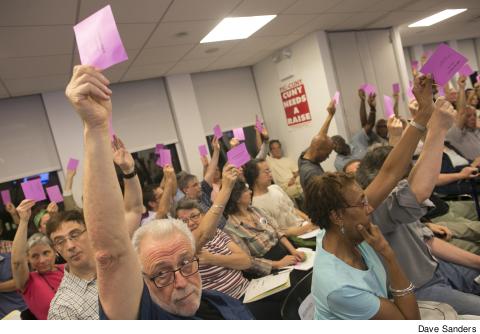 |
Six years after its last contract with CUNY expired, the PSC bargaining team emerged from a round-the-clock bargaining session on June 16 with a new agreement in hand, just days after CUNY reached an agreement with District 37 of the American Federation of State, County and Municipal Employees.
The tentative agreement would provide 10.4 percent raises – including back pay – spread across seven years. And, for the first time, members who work as adjuncts will have the opportunity for multiyear appointments once they meet certain eligibility criteria.
Other gains include a clear path to achieving workload reduction in the near future for full-time faculty, and greater opportunities for advancement among higher education officers (HEOs).
STRUCTURAL CHANGE
Teachers in the CLIP and CUNY Start programs will be moved onto annualized salary lines – another first – and library faculty will see an increase in annual leave that is more commensurate with the leave policy afforded other full-time faculty.
The agreement was put before the union’s general membership for a ratification vote as this issue of Clarion went to press. The vote will conclude on August 3. (See the article on voting methods on this page.)
The agreement contains gains for each of the 27,000 CUNY faculty and employees represented by the PSC.
In a written statement – after extending thanks to Governor Andrew Cuomo, who approved the $240 million the PSC insisted was necessary for retroactive raises, and to Mayor Bill de Blasio – CUNY Chancellor James B. Milliken thanked Bowen and the PSC bargaining team “for the countless hours they dedicated to reaching this successful resolution.”
He continued: “This agreement provides not only a much-needed increase in pay for our many faculty and staff, but it also includes additional provisions important to CUNY’s competitiveness for talent at all levels.”
“I am inspired by the PSC membership,” Bowen said in her statement. “We were able to negotiate a strong, imaginative contract in a period of enforced austerity for public workers because our members mobilized. The fight for our contract was a fight for investment in quality education at CUNY. On behalf of the union bargaining team, I commend our negotiating partners at CUNY, and I thank the many lawmakers in Albany and New York City – as well as the students and community groups – who offered essential support.”
First among the sticking points during negotiations was the multi-year appointment for adjuncts. First Vice President Mike Fabricant described management as putting up fierce resistance to the idea because it represents a structural change – one that strikes a blow against the trend of staffing the university with growing numbers of contingent employees.
SIGNIFICANT ADVANCE
“Is it ideal, is it pure? Absolutely not,” Fabricant said of the adjunct appointment agreement to members at a PSC Delegate Assembly on June 23. “Does it represent a significant advance on job security? Without a doubt.”
The road to the current tentative agreement proved treacherous, full of hairpin turns and sudden stops. After the PSC began escalating its actions, beginning with an October 1 protest outside the apartment building where Milliken lives, negotiations grew more intense, with CUNY making its first economic offer on November 4, the day the union staged a disruptive action at the entrance to the building that houses CUNY headquarters, at which 52 PSC members were arrested. The offer, however, was for a mere 6 percent increase, which Bowen deemed “insulting.”
In his January budget message, Cuomo proposed reducing state funding to senior colleges by $485 million and leave the city to fill in the gap — at the same time he proposed providing $240 million to CUNY for the settlement of union contracts. The $240 million for back pay and salary was later cast into doubt, but the Legislature ultimately prevailed and funding for CUNY senior colleges was included in the state budget — only at last year’s level. To achieve contract settlements, CUNY worked with the city and the state, with clear support from the State Assembly, to identify funds for back pay to 2012.
MOBILIZATION
Meanwhile, the union engaged with community and religious organizations, whose leaders and members joined in actions calling on the governor, the state legislature and city lawmakers to fund CUNY adequately – both for maintaining facilities and programs, and for decent pay for university faculty and employees.
By March 24, with no agreement at hand, the union staged yet another disruptive action, this one outside the governor’s New York City offices, where 41 members lay on the sidewalk amid chants by around a thousand members, students and allies who cried, “Don’t let CUNY die!”
In May, the union conducted a strike authorization vote in which 92 percent of the 10,000 members who voted cast a ballot to authorize the union’s Executive Council to call a strike – despite the repercussions both the union and individual members could experience under the state’s Taylor Law, which forbids strikes by public employees. The June negotiations that yielded the tentative agreement took place with the threat of a strike looming for the fall semester.
“We got what we got because we picketed the chancellor’s house, because we got arrested – twice,” said bargaining team member Blanca Vázquez to the June Delegate Assembly, at which the delegates voted 111-11 to refer the agreement to the membership for ratification. “We got what we got because we mobilized all of those conversations and got the 92 percent. Every time we moved, they moved.”

